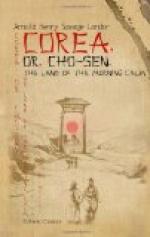Corea, as everybody knows, is an extremely cold country, the thermometer reaching as low sometimes as seventy or even eighty degrees of frost; my readers will imagine therefore how delightfully warm I was in my bed with only one sheet over me and a sort of cotton bed-cover, both sheet and bed-cover, I may add, being somewhat too short to cover my feet and my neck at the same time, my lower extremities in consequence playing a curious game of hide-and-seek with the support of my head. I had ordered a cold bath, and water and tray had been brought into my room before I had gone to bed, but to my horror, when I got up, ready to plunge in and sponge myself to my heart’s content, I found nothing but a huge block of solid ice, into which the water had thought proper to metamorphose itself. Bells there were none in the house, so recourse had to be made to the national Japanese custom of clapping one’s hands in order to summon up the servants.
“He,” answered the slanting-eyed maid from down below, as she trotted up the steps. Good sharp girl that she was, however, she quickly mastered the situation, and hurried down to fetch fresh supplies of unfrozen liquid from the well; although hardly had she left the room the second time before a thick layer of ice again formed on the surface of the bucketful which she had brought. It was bathing under difficulties, I can tell you; but though I do not much mind missing my dinner, I can on no account bring myself to deprivation of my cold bath in the morning. It is to this habit that I attribute my freedom from contagious diseases in all countries and climates; to it I owe, in fact, my life, and I have no doubt to it, some day, I shall also owe my death.
The evil of cold was, however, nothing as compared with the quality and variety of the food. For the best part of the week, during which I stayed at the Dai butzu, I only had an occasional glance at a slice of nondescript meat, served one day as “rosbif,” and the next day as “mutin shops,” but unfortunately so leathery that no Sheffield blade could possibly divide it, and no human tooth nor jaw, however powerful, could masticate it.
As luck would have it, I was asked out to dinner once or twice by an American gentleman—a merchant resident at Chemulpo—and so made up for what would have otherwise been the lost art of eating.
Chemulpo is a port with a future. The Japanese prefer to call it Jinsen; the Chinese, In-chiang. It possesses a pretty harbour, though rather too shallow for large ships. The tide also, a very troublesome customer in that part of the world, falls as much as twenty-eight or twenty-nine feet; wherefore it is that at times one can walk over to the island in front of the settlement almost without wetting one’s feet.




